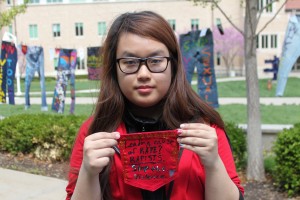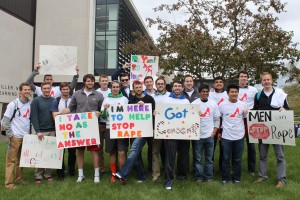By: Amanda Johnson

Every 2 minutes, someone is sexually assaulted in the United States. Nearly 1 in 5 women and 1 in 22 men will experience sexual violence in their lifetime; 1 in 6 women and 1 in 33 men experience rape in their lifetime. Think about all the people you know- think about your family and friends. Does this startle you?
Unfortunately, reality paints a darker picture than what these numbers say. We live in a world where victims are prosecuted, where by-standers capture rape on their phone for laughs rather than for evidence, and where rapes go unreported and rapists go free. Why is it that, in a culture that knows rape is wrong, it is so prevalent?
Sexual violence isn’t comprised of a series of isolated events perpetrated by individuals. It’s engrained in our culture. As scholar Thomas Macaulay Millar wrote, “It takes one rapist to commit a rape, but it takes a village to create an environment where it happens over and over and over.” This is a culture where sexual violence is a normal occurrence and rape can be used as a humorous term- where rape victims can “deserve it.”
“I’d rape her,” is defined by the Urban Dictionary as synonymous with “I’d tap that.”
Those Broncos got raped at the Super Bowl, amiright?
No. No. No.
Rape isn’t tantamount to losing a game. It isn’t a term to use when you find someone attractive.
The lines are being blurred between what constitutes condoned and consensual behavior and what sexual violence really is. In a survey of high school students, 56% of girls and 76% of boys believed forced sex was acceptable under some circumstances. It turns out, when you replace the word ‘rape’ with ‘forced sex,’ a lot more individuals will admit to committing it, being victims of it, and finding it acceptable under certain conditions. We are a culture that normalizes rape, yet, we don’t even seem to understand what it means.
Throughout the last 10 years, the National Crime Victimization Survey has reported that only approximately 30% of rape survivors report the incident to the police. Of those rapes reported to the police only 16% result in prison sentences. This means that only 5% of the time, a man who rapes ends up in prison. Unfortunately, when looking at institutions like university campuses, the numbers get even worse. The Justice Department estimates that even fewer than 5% of completed and attempted rapes of college women are reported to law enforcement officials. This number is even more staggering when you consider that 1 in 4 women will be the victim of sexual violence during her academic career. In these instances, 9 out of 10 women knew their attacker.
Despite the increased prevalence and need for victim services, universities most often lack adequate policies and fail to provide for victims of sexual assault. The Campus Accountability Project, started by Students Active For Ending Rape (SAFE), showed the sad deficiencies in adequate sexual assault policies. Over 80% of policies received a C or below, with none making a grade higher than a B+. Nearly one-third of the policies didn’t comply with federal regulations, and only 40% had a dedicated full-time staff member dedicated to sexual assault prevention and education. In a world where victims are prosecuted, less than one-third of the policies stated that a victim’s dress and past sexual history are relevant during investigation.
In recent years, many universities have gone under fire for directly mishandling or covering up cases of rape and sexual assault- many times making national headlines such as Harvard and Yale. Some, such as Dartmouth, have even seen a decline in applications because of the negative attention. It’s time for universities to take a stand against sexual assault and provide the responsiveness that victims deserve.

Tides are starting to turn though. Fortunately, this year, President Obama has issued a task force to directly deal with sexual assault on college campuses, and Sen. Claire McCaskill has conducted national surveys on the issue and has lead a bipartisan effort through the legislature to combat sexual assault in the military and now on college campuses. This effort is aimed at implementing new regulations that force campuses to adopt and change policies. Moreover, it seeks to provide additional resources to help universities be able to provide crucial services for those affected by sexual violence.
Many campuses have already made a stride towards victim services as well as prevention. Thankfully, the University of Missouri-Kansas City is one such school. It offers many services and support on campus for victims, awareness, and prevention. The UMKC Women’s Center and the Violence Prevention and Response Project seek to strengthen the university and community response to gender-based and sexual violence. Together, and in collaboration with other campus and community offices, the Women’s Center and Violence Prevention and Response Project provide vital training and education on prevention and response, resources and services for those affected by sexual violence including a safe place, referral information. Unlike many universities, UMKC offers a full time Victim Services Adjudication Advisor, Michelle Kroner. Her office, as well as the women’s center, is available to any student.
Now, more than ever, it’s important to remain active and to raise your voice against sexual assault. Sexual assault and rape has received national attention because of people like you. What UMKC and other institutions are doing is significant progress. But, it’s not a fix. Not yet. Remember, 1 is 2 many. If my article makes you uncomfortable: good. Be a person who seeks to change the system instead of ignoring it. Don’t be complicit. We can end the culture that perpetuates rape.
***
Author’s Note: Violence against women is a larger narrative than what simple statistics have to offer. It’s a culture that extends worldwide. It’s a world where one in three women will be raped in their lifetime- where sexual violence is more guaranteed than an education.
*****
Resources:
- http://www.oneinfourusa.org/statistics.php
- http://www.huffingtonpost.com/shanlon-wu/colleges-versus-military-sexual-assault_b_5100534.html
- http://www.slc.edu/offices-services/security/assault/statistics.html
- http://www.publicintegrity.org/accountability/education/sexual-assault-campus
- http://www.invw.org/content/sexual-assault-on-college
- https://www.rainn.org/public-policy/campus-safety
- http://www.huffingtonpost.com/selena-shen/most-colleges-got-a-d-or-_b_5186917.html